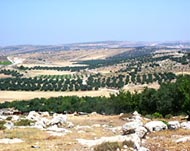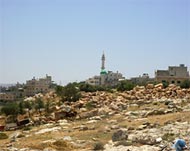When olive branch doesn’t mean peace
As Muhammad Hasan Swaiti was working in his olive orchard recently an Israeli army officer accompanied by several rifle-wielding soldiers came to take his land.

The 75-year-old, whose family has owned the fields for generations, listened while the officer told him in broken Arabic that his land was to be confiscated.
The officer handed him written notifications for other farmers in the area whose orchards and fields were also to be taken.
Baffled and stunned, Swaiti told the officer he must be mistaken since he possessed all the land rights and ownership documents.
The officer nodded and said: “I know, but your land has been confiscated.”
Barrier work
The Israeli army says the land, some of the most fertile in the West Bank, is needed for building “a separation wall” to prevent Palestinian guerrillas from getting into Israel.
Israel is expected to accelerate the construction of the wall to appease rightwing groups opposed to Prime Minister Ariel Sharon’s plan to unilaterally withdraw from the Gaza Strip.
Palestinians, human rights groups, including hundreds of Israeli peace activist, dismiss the official line on the wall as merely a pretext to steal as much Palestinian land as possible.
Swaiti’s son, Isa, who speaks fluent Hebrew, confronted the Israeli officer, asking him why the barrier would be built in the middle of the villagers’ orchards and not on the Israeli side of the borders.
The officer, apparently, had no answer.
Few rights
“He told me that he recognised that Israel was seizing our land unlawfully and unjustly, but he said that is the way it is and that they have the upper hand,” says Isa.
He went on to ask the officer if the Israeli legal system would deliver justice to the villagers and revoke the confiscation.
“I don’t think so,” came the answer.
|
“When occupation arrives, justice leaves. When justice arrives, occupation leaves” Muhammad Hasan Swaiti, |
In all, the villagers of Bait Awwa will lose between 1000 and 1500 dunums (a dunum is 1000 sq m). Some, including Muhammad Swaiti, will be left with nothing.
“In our culture, one’s land is equated with one’s soul. I don’t know how I will be able to live seeing my life-savings and toilings reduced to nil by a strike of a pen.
“I am devastated. Is there no longer justice in this world?”
Asked what he could do, the elderly man said justice and occupation cannot live in the same place or at the same time.
“When occupation arrives, justice leaves. When justice arrives, occupation leaves.”
Destroyed twice
In 1948, the Israeli army destroyed Bait Awwa and confiscated thousands of acres of land belonging to the Swaiti family and other clans from nearby villages. The villagers rebuilt their community, hopeful that the nightmare would not be repeated.
 |
|
The fertile land will be used to |
They were wrong. In June 1967, a few days after the outbreak of the six-day war, the Israeli army again destroyed the village, leaving only three small cottages.
“They told us to leave our homes and raise a white flag. Then the soldiers placed explosives in every building and destroyed all the houses.”
The villagers lived in caves and shacks for years until the former Israeli Defence Minister Moshe Dayyan allowed them to rebuild.
Settlement
In 1984, the Israeli government built a small farming colony on the hilltop opposite Bait Awwa to the west. The settlement is called Shegef and inhabited by Jewish immigrants from Eastern Europe and the former Soviet Union.
Two years later, the Israeli water authority dug two 900m wells, enabling those in the colony to irrigate large tracts of crops.
However, the villagers of Bait Awwa, as is the case all over the West Bank, were prevented from drilling water on their side of the border.
 |
|
Bait Awwa lies on the former |
“This is our water, our land. They stole our land, and our water and we can’t get a single drop of it,” says Yusuf Swaiti, whose family owned the land upon which Shegef was built.
When Aljazeera.net visited Bait Awwa, it found a dry village whose estimated 8000 inhabitants buy their drinking water on the black market at nearly $4 per cubic metre.
Ibrahim Swaiti, another elderly villager who is also about to lose his olive orchard, described the Israelis as “powerful thieves”.
“Imagine yourself living next to a powerful thief. In our case, the thief doesn’t steal petty things like a lamb or a horse or some chicks. He steals our land and our livelihood.”
Resolve
But he remains defiant and hopeful. “God brings the breakthrough,” he says.
“We know that their ultimate goal is to make us leave our homeland and emigrate to some distant land like Canada or Australia.
“But we will disappoint them as we have always done. My father is buried in that cemetery. And I will be buried there and so will be my children and grandchildren after a long life inshaaAllah.
“We are here to stay. We belong to this land and this land belongs to us.”